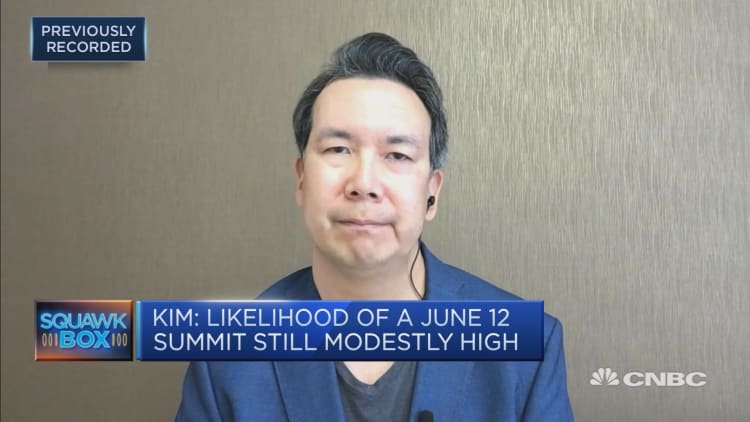
A few days ago, the U.S.-North Korea summit was clouded in "will-they-or-won't-they" uncertainty. Entering a new week, however, the latest developments indicate a resurrected sense of optimism as Seoul looks to insert itself into the picture.
South Korean President Moon Jae-in could join President Donald Trump and Kim Jong Un for their anticipated June 12 meeting in Singapore, Yonhap News reported early on Monday. The news comes after Trump and Kim, over the weekend, resumed efforts to salvage negotiations after they were officially canceled by the U.S. president.
After calling off the dialogue last Thursday, Trump on Friday suggested the meeting could still take place on the originally scheduled date in a sudden reversal widely believed to have undermined Washington's diplomatic credibility.
Further indicating the summit was now back on track, White House and Pyongyang officials met in the border village separating the two Koreas on Sunday while a U.S. delegation
departed for Singapore to work out logistics for the June event.
"Despite the sudden pause in the rush toward a summit, all sides will most likely try to reschedule the meeting," analysts at the Council on Foreign Relations said in a recent note.
Both countries, in addition to South Korea, have vested interests in making the meeting happen next month or at a later date, according to strategists.
"All these parties want a draw-down of tensions and a changed relationship between Pyongyang and the other parties," said Andray Abrahamian, a fellow at foreign policy institute Pacific Forum.
In fact, many theorized that Trump's cancellation was simply a bargaining tactic.
It was "a pre-negotiation walkout and what it does is stress test the other side in terms of who wants what more," explained Jasper Kim, a professor at Seoul-based Ewha Womans University.
Pyongyang responded by saying it was ready to meet with the U.S. at any time, which, according to Kim, told Trump that the North Koreans "want to talk and actually, they want to talk very badly — that's basically to the advantage of the U.S."
Moon's desire to join the historic summit could be a sign that South Korea is the most eager for talks to take place.
Moon is playing the role of mediator "given the reality that inter-Korean reconciliation, and ultimately peace on the Korean Peninsula, cannot be achieved unless the United States and North Korea strike a deal on denuclearization," the Council on Foreign Relations analysts said.
Trump, meanwhile, wants to secure a foreign policy win for his administration while Kim possesses multiple motives that include security guarantees, relief from Washington's sanctions and a status boost that accompanies such a high-profile summit, they continued.
But even with the added presence of Moon, any discussions between the U.S. and the North would be complicated by different understandings of the term "denuclearization."
The White House wants the reclusive regime to take significant steps toward relinquishing nuclear weapons before relaxing any sanctions. Pyongyang, however, prefers a gradual process of disarmament that goes hand-in-hand with U.S. economic and security concessions.

